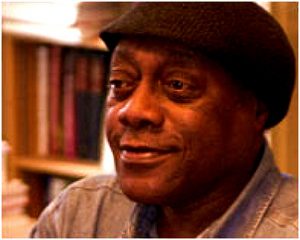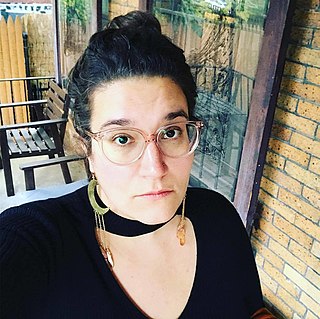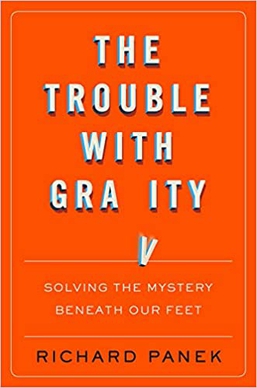Related Research Articles

In astronomy, dark matter is a hypothetical form of matter that appears not to interact with light or the electromagnetic field. Dark matter is implied by gravitational effects which cannot be explained by general relativity unless more matter is present than can be seen. Such effects occur in the context of formation and evolution of galaxies, gravitational lensing, the observable universe's current structure, mass position in galactic collisions, the motion of galaxies within galaxy clusters, and cosmic microwave background anisotropies.

James Alan McPherson was an American essayist and short-story writer. He was the first African-American writer to win the Pulitzer Prize for Fiction, and was included among the first group of artists who received a MacArthur Fellowship. At the time of his death, McPherson was a professor emeritus of fiction at the Iowa Writers' Workshop.

Ursula Kroeber Le Guin was an American author. She wrote works of speculative fiction, including science fiction works set in her Hainish universe, and the Earthsea fantasy series. Her work was first published in 1959, and her literary career spanned nearly sixty years, producing more than twenty novels and over a hundred short stories, in addition to poetry, literary criticism, translations, and children's books. Frequently described as an author of science fiction, Le Guin has also been called a "major voice in American Letters". Le Guin said she would prefer to be known as an "American novelist".

Richard Kingsley Morgan, is a British science fiction and fantasy author of books, short stories, and graphic novels. He is the winner of the Philip K. Dick Award for his 2003 book Altered Carbon, which was adapted into a Netflix series released in 2018. His third book, Market Forces, won the John W. Campbell Award in 2005, while his 2008 work Thirteen garnered him the Arthur C. Clarke Award.

Vera Florence Cooper Rubin was an American astronomer who pioneered work on galaxy rotation rates. She uncovered the discrepancy between the predicted and observed angular motion of galaxies by studying galactic rotation curves. By identifying the galaxy rotation problem, her work provided evidence for the existence of dark matter. These results were later confirmed over subsequent decades.

Lawrence Maxwell Krauss is a Canadian-American theoretical physicist and cosmologist who taught at Arizona State University (ASU), Yale University, and Case Western Reserve University. He founded ASU's Origins Project in 2008 to investigate fundamental questions about the universe and served as the project's director.

Phillip Lopate is an American film critic, essayist, fiction writer, poet, and teacher.

Robert P. Kirshner is an American astronomer, Chief Program Officer for Science for the Gordon and Betty Moore Foundation, and the Clownes Research Professor of Science at Harvard University. Kirshner has worked in several areas of astronomy including the physics of supernovae, supernova remnants, the large-scale structure of the cosmos, and the use of supernovae to measure the expansion of the universe.

Adam Guy Riess is an American astrophysicist and Bloomberg Distinguished Professor at Johns Hopkins University and the Space Telescope Science Institute. He is known for his research in using supernovae as cosmological probes. Riess shared both the 2006 Shaw Prize in Astronomy and the 2011 Nobel Prize in Physics with Saul Perlmutter and Brian P. Schmidt for providing evidence that the expansion of the universe is accelerating.

Sean Michael Carroll is an American theoretical physicist and philosopher who specializes in quantum mechanics, cosmology, and philosophy of science. Formerly a research professor at the Walter Burke Institute for Theoretical Physics at the California Institute of Technology (Caltech) department of physics, he is currently an external professor at the Santa Fe Institute, and the Homewood Professor of Natural Philosophy at Johns Hopkins University. He has been a contributor to the physics blog Cosmic Variance, and has published in scientific journals such as Nature as well as other publications, including The New York Times, Sky & Telescope and New Scientist. He is known for his atheism, his vocal critique of theism and defense of naturalism. He is considered a prolific public speaker and science populariser. In 2007, Carroll was named NSF Distinguished Lecturer by the National Science Foundation.

Thanu Padmanabhan was an Indian theoretical physicist and cosmologist whose research spanned a wide variety of topics in gravitation, structure formation in the universe and quantum gravity. He published nearly 300 papers and reviews in international journals and ten books in these areas. He made several contributions related to the analysis and modelling of dark energy in the universe and the interpretation of gravity as an emergent phenomenon. He was a Distinguished Professor at the Inter-University Centre for Astronomy and Astrophysics (IUCAA) at Pune, India.

Charles Chowkai Yu is an American writer. He is the author of the novels How to Live Safely in a Science Fictional Universe and Interior Chinatown, as well as the short-story collections Third Class Superhero and Sorry Please Thank You. In 2007 he was named a "5 under 35" honoree by the National Book Foundation. In 2020, Interior Chinatown won the National Book Award for fiction.
Dennis Overbye is a science writer specializing in physics and cosmology and is the cosmic affairs correspondent for The New York Times.

Steve Mirsky is a writer for Scientific American, the host of the magazine's longform science podcast, Science Talk. and the producer of the daily 60-Second Science podcast. Mirsky has also written Scientific American's monthly “Anti Gravity” column since 1995 until December 8, 2020.

The 4 Percent Universe: Dark Matter, Dark Energy, and the Race to Discover the Rest of Reality is a nonfiction book by writer and professor Richard Panek and published by Houghton Mifflin Harcourt on January 10, 2011.

Carmen Maria Machado is an American short story author, essayist, and critic best known for Her Body and Other Parties, a 2017 short story collection, and her memoir In the Dream House, which was published in 2019 and won the 2021 Folio Prize. Machado is frequently published in The New Yorker, Granta, Lightspeed, and other publications. She has been a finalist for the National Book Award and the Nebula Award for Best Novelette. Her stories have been reprinted in Year's Best Weird Fiction, Best American Science Fiction & Fantasy, Best Horror of the Year,The New Voices of Fantasy, and Best Women's Erotica.

Chanda Prescod-Weinstein is an American theoretical cosmologist and particle physicist at the University of New Hampshire. She is also an advocate of increasing diversity in science.
Natalie Ann Wolchover is a science journalist. She is a senior writer and editor for Quanta Magazine, and has been involved with Quanta's development since its inception in 2013. In 2022 she won a Pulitzer Prize for Explanatory Reporting.

The Trouble with Gravity: Solving the Mystery Beneath Our Feet is a nonfiction popular science book by Richard Panek and published by Houghton Mifflin Harcourt on July 9, 2019.

The Autistic Brain: Thinking Across the Spectrum is a 2013 nonfiction popular science book written by Temple Grandin and Richard Panek and published by Houghton Mifflin Harcourt. It discusses Grandin's life experiences as a person with autism from the early days of scientific research on the topic and how advances in technology have revolutionized the understanding of autism and its connection to the brain.
References
- 1 2 "Richard Panek Papers, 1983–1995". Special Collections & University Archives. University of Northern Iowa. 2020. Retrieved December 11, 2020.
- 1 2 3 Oakes AI (December 2012). "Review: The 4 Percent Universe". The Journal of the Royal Astronomical Society of Canada . 106 (6): 259. ISSN 0035-872X . Retrieved December 9, 2020.
- 1 2 "Fellows – Richard Panek". John Simon Guggenheim Memorial Foundation . 2020. Retrieved December 11, 2020.
- ↑ "Weekly Calendar: Discussion/Talks". The JHU Gazette . September 29, 2008. Retrieved December 11, 2020.
- ↑ "'Robots': Film Review". The Hollywood Reporter . June 9, 2015. Retrieved December 11, 2020.
- ↑ Zivkovic, Bora (November 29, 2011). "Scienceblogging: a Q&A with the crew of The Last Word on Nothing". Scientific American . Retrieved December 11, 2020.
- ↑ McClung, James W. (September 30, 1989). Annual Report of the Library of Congress 1989 (PDF). Library of Congress. p. 62.
- ↑ "Past Participants". Antarctic Artists and Writers Program . National Science Foundation. 2020. Retrieved December 11, 2020.
Richard Panek, Writer, 2008. Traveling to Amundsen-Scott South Pole Station he visited the South Pole Telescope (SPT) site and interviewed scientists working on project. The South Pole Telescope is an integral component of a book that he is writing called, Let There Be Dark: At the Dawn of the Next Universe; a comprehensive account of dark matter, dark energy, and the revolution in our understanding of the universe. Award #: 0739893
- ↑ "2012 Science Communication Award – Richard Panek". American Institute of Physics . 2012. Retrieved December 11, 2020.
- ↑ "Goodreads Choice Awards Announce Their "Best Books of 2013"". Tor.com . December 3, 2013. Retrieved December 11, 2020.
- ↑ Panek, Richard (2019). "Episode 32: Brian Keating Interviews Richard Panek About The Trouble With Gravity". Into The Impossible (Interview). Interviewed by Brian Keating. Arthur C. Clarke Center For Human Imagination. Retrieved December 11, 2020.
- ↑ Panek, Richard (January 19, 2011). "Dark Matter, Dark Energy, and the Universe". The Leonard Lopate Show (Interview). Interviewed by Leonard Lopate. WNYC-FM . Retrieved December 11, 2020.
- ↑ Panek, Richard (July 14, 2004). "Richard Panek". The Leonard Lopate Show (Interview). Interviewed by Leonard Lopate. WNYC-FM . Retrieved December 11, 2020.
- ↑ Siegel, Ben; Halio, Jay L.; Friedman, Melvin J., eds. (1999). American Literary Dimensions: Poems and Essays in Honor of Melvin J. Friedman. University of Delaware Press. pp. 202–216. ISBN 9780874136869.
- ↑ Blades, John (August 7, 1995). "America's Past Time". Chicago Tribune . Retrieved December 11, 2020.